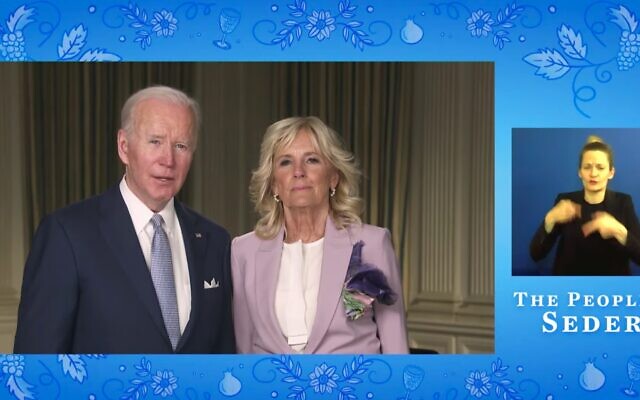In an op-ed published Wednesday for Passover, US President Joe Biden laid out his administration’s approach to combating antisemitism.
“Under my presidency, we continue to condemn antisemitism at every turn. Failure to call out hate is complicity. Silence is complicity. And we will not be silent,” he wrote on CNN’s website.
Biden touted his decision to appoint Holocaust scholar Deborah Lipstadt as the first ambassador-level special envoy to monitor and combat antisemitism; the visits by Second Gentleman Doug Emhoff — the first Jewish spouse of a US president or vice president — to Poland and Germany to promote Holocaust awareness; the convening of a White House summit on hate-fueled violence; the crafting of an inter-agency strategy for combating antisemitism slated to be released later this year; and the hosting of White House events that reinforce Jewish culture as essential to the American story.
Nonetheless, antisemitic attacks in the United States are as prevalent as ever.
An Anti-Defamation League report released last month found that a record 3,697 incidents were reported in the US last year. The figure averages out to 10 incidents per day and represents a 36 percent jump from the record high in 2021. The 2022 tally was the highest since the ADL started keeping records in 1979.
In an interview with The Times of Israel, Lipstadt lamented the number of reported incidents targeting Jews while suggesting the success of the administration’s efforts to combat antisemitism shouldn’t necessarily be gauged by them.
Instead, she pointed to her efforts to get governments abroad to take the issue seriously, while conceding that success on this front won’t solve antisemitism.
Illustrative: A hand-drawn swastika is seen on the front of Union Station near the Capitol in Washington, DC, January 28, 2022. (AP/J. Scott Applewhite, File)
“We’ve been able to make it clear that antisemitism is not a niche issue. It’s not just about the Jews… but it has an impact on our foreign policy and some parts of domestic policy as well,” Lipstadt said.
“My predecessors had it a teeny bit easier in the sense that they could go to these other countries and say, ‘You have a problem, and we in the United States are very concerned about it and we want you to address it,’” she continued.
“But as Secretary [of State Antony] Blinken said… when Ambassador Lipstadt goes someplace, she can’t say we’ve solved the problem. She says, ‘We know we have a problem. What can we do together?’”
“Someone said to me recently, ‘You’re doing a great job.’ I said, ‘You know, there’s been a tremendous rise in antisemitism. They said, ‘Yes, but imagine how much worse it would be if you and your team weren’t addressing it.’”
Lipsadt’s ability to address domestic antisemitism is limited, as her mandate as an ambassador of the State Department is to address Jew-hatred overseas. She did not go as far as to endorse the establishment of an additional office to focus on combating antisemitism within the US. “I feel that it’s a good thing that each agency… is looking and saying how can we address this. The reason we need it in the State Department is that it had really fallen between the cracks.”

US President Joe Biden and First Lady Jill Biden address the White House virtual seder on April 14, 2022. (Screen capture/YouTube)
Pressed on why increased engagement won’t necessarily lead to a decrease in attacks, the antisemitism envoy responded by quoting a line from the Passover Haggadah.
“The authors of the Passover Haggadah, one of our oldest texts, recognized hundreds of years ago that ‘in every generation there are those who rise up to destroy us,’ which is why historians talk about antisemitism as the oldest hatred,” Lipstadt said. “But there’s a second part to that line from the Haggadah, and it cuts to resiliency: “And God saves us from their hands.’ For believers, they say there’s a divine hand of rescue. Others, including believers, say it’s been because of people that we’ve managed to withstand and address [threats against Jews].”
Lipstadt said she’s often asked whether contemporary antisemitism is comparable to 1930s Europe, adding the current phenomenon is not as bad. “What is dramatically different is that in 1930s Europe this was being perpetrated by governments or by individuals with the strong support of governments. Today, you have a myriad of countries with special envoys and representatives to fight this hatred,” she said.

Police stand in front of the Congregation Beth Israel synagogue, Jan. 16, 2022, in Colleyville, Texas (AP Photo/Brandon Wade)
As for former US president Donald Trump, who has denounced the Manhattan prosecutor who indicted him this week as the “hand-picked” candidate of Jewish billionaire George Soros, Lipstadt avoided directly commenting.
“I don’t want to get involved in that because there’s a campaign, but I will say that I’m disturbed by many people and many other countries and individuals who use those kinds of boogeymen. It doesn’t always, but it certainly can have antisemitic implications,” she said.
Looking ahead, Lipstadt said she’s looking to continue her engagement with Muslim-majority countries, following the Abraham Accords normalization agreements that the Trump administration brokered between Israel and several Arab countries.
“While there is a very serious territorial dispute in the Israel-Palestinian conflict, that is something separate from prejudice. To say that there’s a conflict between Israel and the Palestinians and that therefore it’s okay to hate Jews, I would say that’s wrong and is a form of prejudice. We’re stressing that message,” she said.
“Certainly addressing the misuse of social media is on the agenda as well,” Lipstadt added. “I’m pretty satisfied with what we’ve been able to do so far, but it’s only beginning.”
